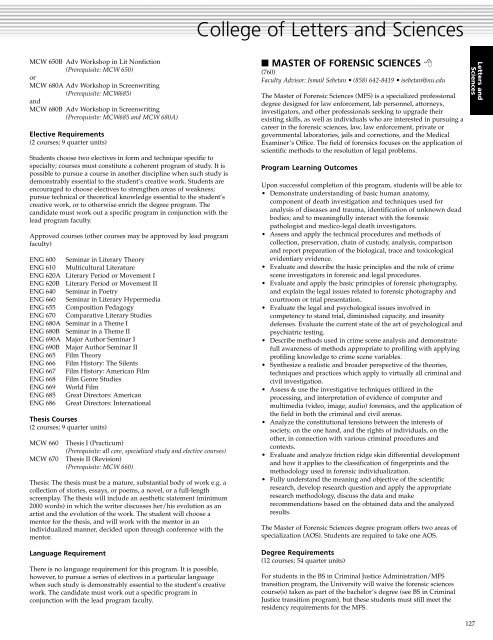Catalog 73 - National University
Catalog 73 - National University
Catalog 73 - National University
- No tags were found...
You also want an ePaper? Increase the reach of your titles
YUMPU automatically turns print PDFs into web optimized ePapers that Google loves.
College of Letters and SciencesMCW 650B Adv Workshop in Lit Nonfiction(Prerequisite: MCW 650)orMCW 680A Adv Workshop in Screenwriting(Prerequisite: MCW685)andMCW 680B Adv Workshop in Screenwriting(Prerequisite: MCW685 and MCW 680A)Elective Requirements(2 courses; 9 quarter units)Students choose two electives in form and technique specific tospecialty; courses must constitute a coherent program of study. It ispossible to pursue a course in another discipline when such study isdemonstrably essential to the student’s creative work. Students areencouraged to choose electives to strengthen areas of weakness;pursue technical or theoretical knowledge essential to the student’screative work, or to otherwise enrich the degree program. Thecandidate must work out a specific program in conjunction with thelead program faculty.Approved courses (other courses may be approved by lead programfaculty)ENG 600 Seminar in Literary TheoryENG 610 Multicultural LiteratureENG 620A Literary Period or Movement IENG 620B Literary Period or Movement IIENG 640 Seminar in PoetryENG 660 Seminar in Literary HypermediaENG 655 Composition PedagogyENG 670 Comparative Literary StudiesENG 680A Seminar in a Theme IENG 680B Seminar in a Theme IIENG 690A Major Author Seminar IENG 690B Major Author Seminar IIENG 665 Film TheoryENG 666 Film History: The SilentsENG 667 Film History: American FilmENG 668 Film Genre StudiesENG 669 World FilmENG 685 Great Directors: AmericanENG 686 Great Directors: InternationalThesis Courses(2 courses; 9 quarter units)MCW 660MCW 670Thesis I (Practicum)(Prerequisite: all core, specialized study and elective courses)Thesis II (Revision)(Prerequisite: MCW 660)Thesis: The thesis must be a mature, substantial body of work e.g. acollection of stories, essays, or poems, a novel, or a full-lengthscreenplay. The thesis will include an aesthetic statement (minimum2000 words) in which the writer discusses her/his evolution as anartist and the evolution of the work. The student will choose amentor for the thesis, and will work with the mentor in anindividualized manner, decided upon through conference with thementor.■ MASTER OF FORENSIC SCIENCES (760)Faculty Advisor: Ismail Sebetan • (858) 642-8419 • isebetan@nu.eduThe Master of Forensic Sciences (MFS) is a specialized professionaldegree designed for law enforcement, lab personnel, attorneys,investigators, and other professionals seeking to upgrade theirexisting skills, as well as individuals who are interested in pursuing acareer in the forensic sciences, law, law enforcement, private orgovernmental laboratories, jails and corrections, and the MedicalExaminer’s Office. The field of forensics focuses on the application ofscientific methods to the resolution of legal problems.Program Learning OutcomesUpon successful completion of this program, students will be able to:• Demonstrate understanding of basic human anatomy,component of death investigation and techniques used foranalysis of diseases and trauma, identification of unknown deadbodies; and to meaningfully interact with the forensicpathologist and medico-legal death investigators.• Assess and apply the technical procedures and methods ofcollection, preservation, chain of custody, analysis, comparisonand report preparation of the biological, trace and toxicologicalevidentiary evidence.• Evaluate and describe the basic principles and the role of crimescene investigators in forensic and legal procedures.• Evaluate and apply the basic principles of forensic photography,and explain the legal issues related to forensic photography andcourtroom or trial presentation.• Evaluate the legal and psychological issues involved incompetency to stand trial, diminished capacity, and insanitydefenses. Evaluate the current state of the art of psychological andpsychiatric testing.• Describe methods used in crime scene analysis and demonstratefull awareness of methods appropriate to profiling with applyingprofiling knowledge to crime scene variables.• Synthesize a realistic and broader perspective of the theories,techniques and practices which apply to virtually all criminal andcivil investigation.• Assess & use the investigative techniques utilized in theprocessing, and interpretation of evidence of computer andmultimedia (video, image, audio) forensics, and the application ofthe field in both the criminal and civil arenas.• Analyze the constitutional tensions between the interests ofsociety, on the one hand, and the rights of individuals, on theother, in connection with various criminal procedures andcontexts.• Evaluate and analyze friction ridge skin differential developmentand how it applies to the classification of fingerprints and themethodology used in forensic individualization.• Fully understand the meaning and objective of the scientificresearch, develop research question and apply the appropriateresearch methodology, discuss the data and makerecommendations based on the obtained data and the analyzedresults.The Master of Forensic Sciences degree program offers two areas ofspecialization (AOS). Students are required to take one AOS.Letters andSciencesLanguage RequirementThere is no language requirement for this program. It is possible,however, to pursue a series of electives in a particular languagewhen such study is demonstrably essential to the student’s creativework. The candidate must work out a specific program inconjunction with the lead program faculty.Degree Requirements(12 courses; 54 quarter units)For students in the BS in Criminal Justice Administration/MFStransition program, the <strong>University</strong> will waive the forensic sciencescourse(s) taken as part of the bachelor’s degree (see BS in CriminalJustice transition program), but these students must still meet theresidency requirements for the MFS.127
















